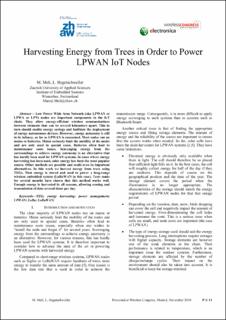Please use this identifier to cite or link to this item:
https://doi.org/10.21256/zhaw-18842Full metadata record
| DC Field | Value | Language |
|---|---|---|
| dc.contributor.author | Meli, Marcel | - |
| dc.contributor.author | Hegetschweiler, Lukas | - |
| dc.date.accessioned | 2019-12-05T13:47:26Z | - |
| dc.date.available | 2019-12-05T13:47:26Z | - |
| dc.date.issued | 2018-11 | - |
| dc.identifier.uri | https://digitalcollection.zhaw.ch/handle/11475/18842 | - |
| dc.description.abstract | Low Power Wide Area Network (aka LPWAN or LPWA or LPN) nodes are important components in the IoT chain. They allow energy-efficient wireless communications between elements that can be several kilometers apart. This in turn should enable energy savings and facilitate the deployment of energy autonomous devices. However, energy autonomy is still in its infancy, as far as LPWAN is concerned. Most nodes run on mains or batteries. Mains seriously limit the mobility of the nodes and are only used in special cases. Batteries often lead to maintenance costs issues. Scavenging energy from the surroundings to achieve energy autonomy is an alternative that has hardly been used for LPWAN systems. In cases where energy harvesting has been used, solar energy has been the most popular source. Other methods are possible and could even be important alternatives. In this work we harvest energy from trees using TEGs. That energy is stored and used to power a long-range wireless embedded system (LoRaWAN in this case). Tests made for several months have shown that this method works well. Enough energy is harvested in all seasons, allowing sensing and transmission of data several times per day. | de_CH |
| dc.language.iso | en | de_CH |
| dc.publisher | WEKA | de_CH |
| dc.rights | Licence according to publishing contract | de_CH |
| dc.subject | LoRaWAN | de_CH |
| dc.subject | LPWAN | de_CH |
| dc.subject | LoRa | de_CH |
| dc.subject | Wireless | de_CH |
| dc.subject | Low power | de_CH |
| dc.subject | Energy harvesting | de_CH |
| dc.subject | TEG | de_CH |
| dc.subject.ddc | 004: Informatik | de_CH |
| dc.title | Harvesting energy from trees in order to power LPWAN IoT nodes | de_CH |
| dc.type | Konferenz: Paper | de_CH |
| dcterms.type | Text | de_CH |
| zhaw.departement | School of Engineering | de_CH |
| zhaw.organisationalunit | Institute of Embedded Systems (InES) | de_CH |
| zhaw.publisher.place | Munich | de_CH |
| dc.identifier.doi | 10.21256/zhaw-18842 | - |
| zhaw.conference.details | Wireless Congress 2018, Munich, 21-22 March 2018 | de_CH |
| zhaw.funding.eu | No | de_CH |
| zhaw.originated.zhaw | Yes | de_CH |
| zhaw.publication.status | updatedVersion | de_CH |
| zhaw.publication.review | Peer review (Abstract) | de_CH |
| zhaw.title.proceedings | Wireless congress proceedings | de_CH |
| zhaw.webfeed | Erneuerbare Energien | de_CH |
| zhaw.webfeed | Information Engineering | de_CH |
| zhaw.webfeed | Sensorik | de_CH |
| zhaw.webfeed | Wireless Communication | de_CH |
| zhaw.author.additional | No | de_CH |
| Appears in collections: | Publikationen School of Engineering | |
Files in This Item:
| File | Description | Size | Format | |
|---|---|---|---|---|
| harvesting_energy_from_trees_meli_November2018 v2.pdf | 2.18 MB | Adobe PDF |  View/Open |
Show simple item record
Meli, M., & Hegetschweiler, L. (2018, November). Harvesting energy from trees in order to power LPWAN IoT nodes. Wireless Congress Proceedings. https://doi.org/10.21256/zhaw-18842
Meli, M. and Hegetschweiler, L. (2018) ‘Harvesting energy from trees in order to power LPWAN IoT nodes’, in Wireless congress proceedings. Munich: WEKA. Available at: https://doi.org/10.21256/zhaw-18842.
M. Meli and L. Hegetschweiler, “Harvesting energy from trees in order to power LPWAN IoT nodes,” in Wireless congress proceedings, Nov. 2018. doi: 10.21256/zhaw-18842.
MELI, Marcel und Lukas HEGETSCHWEILER, 2018. Harvesting energy from trees in order to power LPWAN IoT nodes. In: Wireless congress proceedings. Conference paper. Munich: WEKA. November 2018
Meli, Marcel, and Lukas Hegetschweiler. 2018. “Harvesting Energy from Trees in Order to Power LPWAN IoT Nodes.” Conference paper. In Wireless Congress Proceedings. Munich: WEKA. https://doi.org/10.21256/zhaw-18842.
Meli, Marcel, and Lukas Hegetschweiler. “Harvesting Energy from Trees in Order to Power LPWAN IoT Nodes.” Wireless Congress Proceedings, WEKA, 2018, https://doi.org/10.21256/zhaw-18842.
Items in DSpace are protected by copyright, with all rights reserved, unless otherwise indicated.